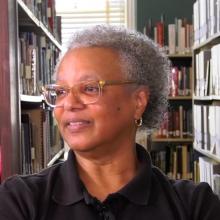
Darlene Quarles Robinson
Rose Hill Elementary School, Stone Robinson Elementary, Jack Jouett Junior High School, Albemarle High SchoolDarlene Quarles Robinson: If I’m correct, I think someone came and talked to a few of us girls to actually going to try out for cheerleading, and some of us did.
Phyllis Leffler: But you had never done this before?
Darlene Quarles Robinson: I had never done it before. I had a hard time with one of those things you had to do, the herkie or some kind of thing, I tried out and did the best I could. I must admit, I wasn’t a fan of all the scrutiny, being a cheerleader.
Phyllis Leffler: You were not a fan?
Darlene Quarles Robinson: I was in the spotlight a lot now and as a cheerleader. In some ways, that was good. Everybody knew who you were, it was good. But you were also under scrutiny as far as how you behaved, how you responded to people and things, and I tried to govern myself in the fact that I tried to treat people the way I wanted to them to treat me. To see that I was just as human, I was just a person, just like they were. And as I talked to Trinkle Jones, and she was the captain of the cheerleading squad and I asked her, I said did myself, and her name was Deni at the time, I said, did we take somebody’s place on the cheerleading squad? She said, no. She said it was a 10-person squad and they added two more. That was myself and Deni and it became a 12-person squad. Because I always thought about that. But it was nice to be able to stay after school, practice. That was another social outlet. It involved traveling to other schools, seeing what — I came from a finite world that was predominantly Black. Go to desegregated schools and you think Albemarle is the “it” school, right? But then when you travel to other schools, you find that it’s not really the “it” school, it’s just one of the schools. I remember going to Woodridge. They had a nice school. GW-Danville, that could’ve been a college campus as huge as that school was.